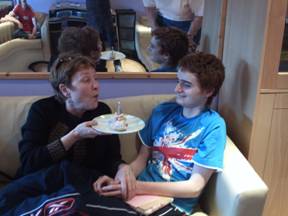You are here
- Home
- Conferences
- Conference 2009
- Parental accounts of autism
Parental accounts of autism
Mary Langan

Parents of children with autism now play a prominent role in the public discourse about autism. Over the past decade a range of autobiographies, novels, films and documentaries have presented the parental experience of autism to a widening audience. These accounts deal with controversies over causation, therapies and treatments and the challenges of family life with autistic children. The contrast with the past is striking. In the half century following the identification of autism in the 1940s, when autism was considered a rare and obscure condition, parents commonly endured ignorance, indifference and stigma. They were largely invisible in the public realm and deferential towards professionals. Parental energies were restricted to campaigns for recognition and resources.
The high profile of contemporary autism parents reflects the dramatic advance in public awareness and fascination with autism. Yet though parental voices are now heard, they are often discordant. Some parents express the conviction that autism is a destructive disease process caused by vaccines or other environmental toxins and seek retribution through litigation while promoting unorthodox biomedical therapies. Other parents oppose this approach, rejecting the deficit model of autism and promoting acceptance of autistic difference. This outlook is broadly endorsed by a growing body of activists who identify themselves as being autistic or having Asperger's syndrome.
This study of parental accounts reviews the dramatic transformation in the place of parents in the world of autism. Long marginal, they have now become central, challenging the authority of doctors, scientists and policy-makers over issues such as the 'autism epidemic', vaccine-autism theories, biomedical interventions, behavioural education programmes, autistic identity itself. Conflicting parental approaches to these issues reflect wider contemporary controversies over questions of health and disability and also reach back to historical attitudes towards difference and incapacity.
Contact us
About the Group
If you woud like to get in touch with the Social History of Learning Disability (SHLD) Research Group, please contact:
Liz Tilley
Chair of the Social History of Learning Disability (SHLD) Research Group
School of Health, Wellbeing and Social Care
Faculty of Wellbeing, Education and Language Studies
The Open University
Walton Hall
Milton Keynes
MK7 6AA
About the website
If you have any feedback or would like to report a problem with the website, please contact WELS-Research-Admin@open.ac.uk.